DG&A High Power Rocketry Sonik-Blast
DG&A High Power Rocketry - Sonik-Blast {Kit}
Contributed by Greg Deeter
| Construction Rating: | starstarstarstarstar |
| Flight Rating: | starstarstarstarstar |
| Overall Rating: | starstarstarstarstar |
| Manufacturer: | DG&A High Power Rocketry |
Brief:
This is a simple to build, strong stable and attractive 4" rocket kit
offered for a very reasonable price from Danny Cantu of DG&A Rocketry in
Texas. It has a 38mm motor mount for single stage flights, recovery is by a
high quality 30" rip-stop nylon chute and this is a perfect bird to
consider for Level 1 certification on a Cesaroni Pro38 "H" 143SS or
"H" 153.
Construction:
After building a DG&A WASP and being very pleased with it, I decided to
look more into the DG&A line of kits. The SONIK-BLAST was very appealing to
me due to the elliptical fins which closely resemble those of the original
Estes Astron Sprint from the late '60's and early 70's, one of my all time
favorite rockets. This SONIK-BLAST was also my first 4" airframe rocket.
The kit came complete with LOC airframes, bulkhead for a payload bay, high quality R.W.W. nose cone, top notch plywood centering rings, excellent 5 ply plywood fins, top quality recovery system, excellent decals and superb instructions.
As this was not the first high powered rocket I have built I did not need or use the instructions, however I did glance them over and they are excellent, complete with high quality photos of every important step.
I purchased this rocket from Chad Ellis of C.L.E. Enterprises of Houston Texas (http://www.motorman.us/) who is also the largest motor vendor in Texas. Apparently Chad obtained this and several other DG&A kits from Danny at a previous launch and brought them back to Houston as a favor for other club members who needed them.
The first thing I did was remove the glassine layer from the 38mm motor tube, by getting it started peeling with the spiral with an X-Acto knife. That allows the epoxy to seep into the tube for prime adhesion. I then replaced the screw eyes that came with the kit and used stainless steel U-Bolts from Lowe's Hardware for the recovery harness and bulkhead connections. Eye-Bolts that are not welded shut will stretch out and fail and should never be used in a high-powered rocket (unless welded shut). I have had Midas Muffler weld eye-bolts shut for me before yet now I prefer stainless steel U-Bolts.
I then sanded the fins' leading edges with a palm sander, built the motor mount with 28 minute epoxy, cut the fin slots with a very sharp new X-Acto Brand knife (not a cheap made in China spin-off) and in less than 2 hours over a period of 3 days (this was just a casual build) had it done. The fins are only mounted to the motor tube with 28 minute epoxy, there are no internal fillets nor any external fillets.
Finishing:
This rocket was still naked for it's maiden voyages. I started it on a Wed
afternoon and finished up on a Friday night, and as it was raining steady I
never got a chance to paint it, plus I expected the launch that Saturday to be
scrubbed due to rain anyway.
Saturday morning, December 4th, 2004 I woke around 5AM and checked the Internet for weather conditions and local club launch status and I was quite surprised to see that the Houston's NHRC that flies at NASA's Johnson Space Center still seemed to be a go, even though there had been nasty weather and rain was expected. Another club member E-Mailed me asking if I was going and that's all it took! I grabbed the rocket out of the garage, fins felt fine, secured the nose cone with some little plastic rivets from Public Missiles, dropped a pair of rail buttons on it from railbuttons.com (I used the Delrins) and she was ready to fly!
The night before I had JB Welded on a new 38mm Bell shaped slimline from Giant Leap, which I also purchased from C.L.E. Enterprises in Houston. They look cool!
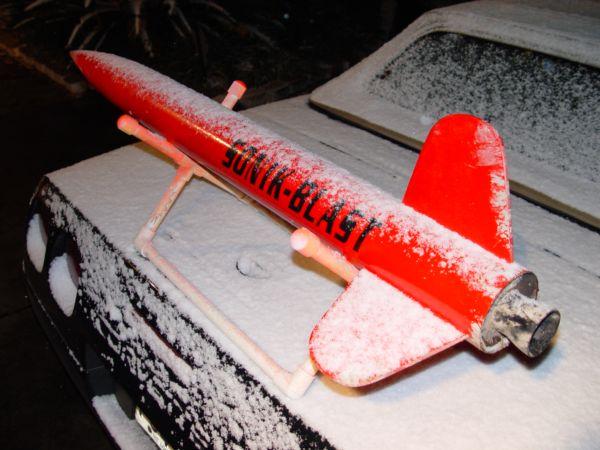
It's SNOWING in Houston!
For construction I am giving this kit a well deserved 5/5. It was extremely simple and fun to build and it's a strong reliable bird!
Construction Rating: 5 out of 5
Flight:
The first flight was at NASA's Johnson Space Center in Houston Texas with the
NHRC club (http://www.nasarocketclub.com) as part
of the HPR at JSC where high powered FAA waivered rocketry returned after
several years.
For the first flight I selected a Cesaroni Pro38 H153 and set the delay to 12. The delay was a little longer than needed so for the next (2) flights also on CTI Pro38 H153's I used a delay of 10 which was perfect.
The first flight revealed that the supplied 30" chute had a little more drift than desired so for the 2nd, 3rd and 4th flights I used a TAC-1 24' chute which I also purchased from C.L.E. Enterprises who attended the launch with full vendor support.
The first flight landed about 300 yards away on the supplied 30" chute. The second flight landed about 200 yards away with the TAC-1 chute and the third flight landed about 200 feet from the rail with the TAC-1 chute. Finally the fourth flight landed only about 120 yards away on a CTI Pro38 I205-14.
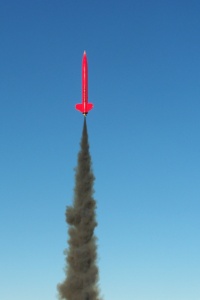
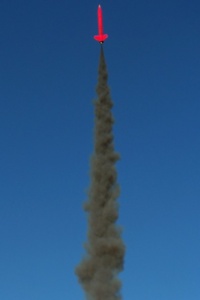
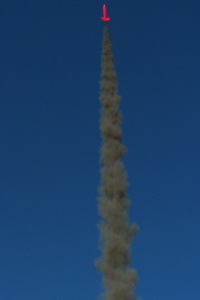
(photos by Warren Benson)
Flights five and six were at a field with a limit of a G motor so I used Cesaroni Pro38 G's for those two flights and it performed flawlessly on them as well.
The seventh flight (below-left) was at NASA's Lyndon B. Johnson Space Center in Houston Texas and for it I selected a LOKI Research H144, which was just released in October of 2004. It was my second time to use one and the first time to build one on the field with no assistance. I found the reload to be quite simple to assemble and the performance to be outstanding. The H144 uses a "LOKI White" propellant which produces a large brilliant white flame and lots of puffy white smoke (see photo taken by David Montgomery.). I am very impressed with the LOKI Research motors and plan on using a lot more of them in the near future.
The eighth flight (below-right) was on January 1st, 2005 at Alpha Ranch in Waller County Texas with the NHRA (Northwest Houston Rocketry Association - http://www.nhra-texas.org/) . I had just picked up my order of LOKI Research "I"405's that I nearly stole as part of a year end sale from C.L.E. Enterprises in Houston. By purchasing (4) "I"'s, I obtained a free "I" hardware which normally sells for $59.99. Being eager as a beaver to try one of the new LOKI I's, I built the reload on the field in about 10 minutes. The LOKI Research I405 is a regressive 1.2 second burn (8) grain 480 N-s motor (formerly I305) that uses the LOKI white propellant. As you can see by the excellent photo thanks to Michael Martin the brilliant white flame is nearly as large as the Sonik-Blast rocket itself, and the puffy white smoke is remarkable as well. The Sonik-Blast screamed off the pad so fast on the I405 that I was not able to track it with a video camera as the speed was unreal. The motor produced a deep throaty angry roar and it was at 3000 feet in the blink of an eye. Perfect flight and thanks to Challenger 498 club President Brad Winbigler for the ATV retrieval out in the horse pastures.
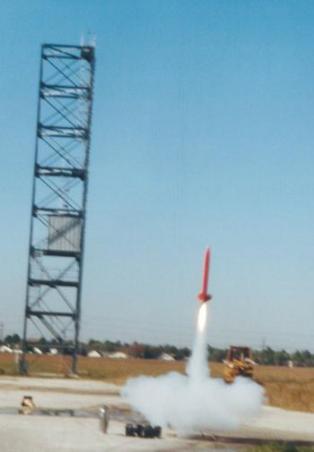
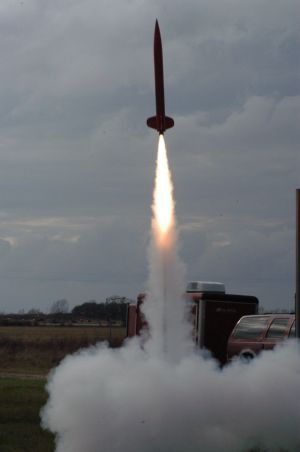
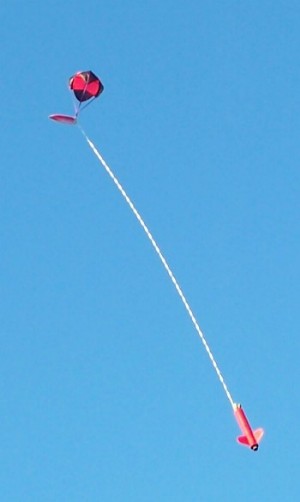 Recovery:
Recovery:
The fourth flight of this rocket was my first time to use an "I"
motor. After flying (3) times on H153's the RSO cleared me for my first
"I" motor. And once again I purchased the CTI Pro38 I205 from CLE
Enterprises our motor and more vendor onsite.
The "I" motor flight was just beautiful and my adrenaline was still at a peak even 12 hours later. The 14 second (unadjusted) CTI delay brought it down nose cone down for a few seconds which was best for field and wind conditions and it was recovered just fine and ready to fly another day thanks to Mike Williams (L3) who helped me find it when I got disoriented in the field.
Another interesting thing to note is that the DG&A SONIK-BLAST, just like the DG&A WASP have slots cut at the leading root edges of the fins, and if they are left as is with no external fillets they will whistle when the rocket is slowing down for apogee on H's and I's. This rocket whistled all (3) times on H153's and did it again on an I205 yet it was harder to hear on the I205 as it was a lot higher up.
This rocket is getting a well deserved 5/5 for flight and recovery.
Flight Rating: 5 out of 5
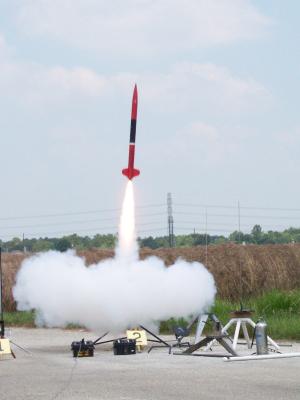
Summary:
DG&A kits are awesome. They are not expensive and are a great way to L1
certify. If you take my (4) first flights of this rocket on December 4th at
NASA for an example, all four of those flights are what are needed to L1
certify, so had I not already been Tripoli L1, that would have done it as well.
I highly suggest this rocket for anyone want to do an L1 attempt. This will do
it for you!
Now that the rain has stopped I am giving this entire rocket a nice coat of gloss red and it will remain an active rocket in my fleet for some time to come I am sure. I have also ordered the MINI SONIK-BLAST in the 3" version for fields with up to "G" capability.
For the overall rating of this rocket, I have to give it the highest score there is, 5/5 as it and DG&A well deserve that! Thanks Danny for some totally killer rockets! And thanks C.L.E. Enterprises in Houston for outstanding vendor support!
Overall Rating: 5 out of 5
 |
 |